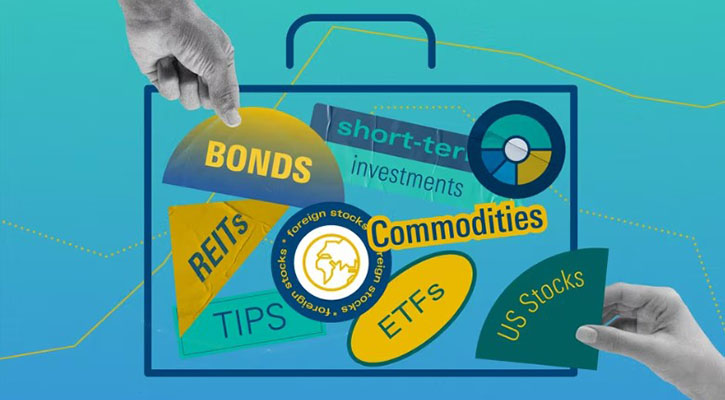In their hunt for return, investors will this year also arrive at, among other things, government and corporate bonds from emerging countries (emerging market debt or EMD). The interest rate in developed economies has only decreased in recent years. The expectation is that this can now only increase, after perhaps an initial period of being kept artificially low in order to stimulate the economy. For an acceptable return, therefore, investors are forced to look elsewhere in the world, although the spreads on EMD have actually been decreased. In this context, emerging countries and companies in these economies would love to see bond investors come to them. They want to grow and need financing.
World tour
Investing in emerging market debt is just like travelling. The fact that you can now fly relatively easily and cheaply to every corner of the world does not mean that you should always do this. Where a traveller avoids unsafe areas or encounters problems with a visa, the bond investor also encounters obstacles. They do not always have easy access to local credit markets of emerging countries, there are sometimes capital restrictions for foreign investors, there may be withholding tax levied and there can be other legal and regulatory obstacles.
“The path to return with emerging market debt leads through landmines", warns William Ledward, Senior Vice President and Portfolio Manager with the Fixed Income Group of asset manager Franklin Templeton, “however, it remains a very promising asset class”.
With Ledward as a reserved tour guide, let's travel through the world of government and corporate bonds from emerging countries.
Four flavours
Emerging market debt comes in four flavours: government bonds or corporate bonds in local or hard currency. This already shows that EMD offers many diversification opportunities. There is a choice of quite a few countries, companies, currencies and yield curves. This also makes it complex, according to Ledward, and he believes that a private investor in EMD would do well to appoint a fund manager and its analyst team. “It is extremely difficult for private investors to do all the homework themselves”.
‘Government bonds in hard currency’ is the most mature category. Initially, issues of government bonds of emerging countries had to take place in USD to win over suspicious investors. During the course of the years, investors have become to feel more relaxed with positions in debts of emerging economies. As a result of a changing risk perception, governments in emerging countries have also been able to issue bonds in local currency. The attraction of this ‘emerging market local currency debt’ consists of a relatively high return and currency gains.
According to Ledward, many emerging countries are complex to invest in. China and India are not easily accessible for foreign bond investors and Brazil levies an 'entry tax' that must be paid in advance, “Therefore you already start with a loss of 6% on your investment. Such measures were taken because Brazil was afraid that a great demand for its Real would lead to a higher exchange rate for its currency. There has also been a lot of volatility over the past year due to depreciating currencies”.
Currencies of emerging countries remain vulnerable to volatility as a result of switching between the risk on and risk off mode by investors and a –suddenly- great demand for or supply of local currency can be.
In addition, the economic policies of emerging countries are fundamentally an export-oriented model . Here are competitive exchange rates needed. Investors should be aware that governments in these countries do not hesitate to use ad hoc policies to stop the appreciation of the local currency.
Ledward has also experienced that he could not leave a country as an investor. “It took us a year to get out of Malawi.” He will not elaborate on the obstacles. “Egypt is also a country surrounded by uncertainties. The Central Bank of Egypt does not want you to convert your bond in Egyptian pounds into US dollars, for example. You do not know the exchange rate at which you can leave the country. Sometimes you are trapped in a country, and you can do nothing except reinvest there”.
In this respect, the market for government bonds in hard currency is much more accessible and easier to leave again. “It was an enormous bull market, but the return has decreased dramatically in recent years”, Ledward reflects. “The JPM Emerging Market Bond Index is currently at 4.64, that is still above the lowest point of 4.33 at the start of January, but a year ago it was at 5.6”.
Landmines
After the government bond in local currency, the ‘corporate bond local currency’ is the youngest category in which investors can invest. Ledward: “The appeal of corporate bonds in local currency is that they are a natural currency hedge, because the economies are often export-driven”.
Despite bankruptcies and volatility, the bond connoisseur considers that corporate bonds from emerging economies should not be missed and that there are bargains to be found. “But you must still be vigilant. Corporate governance is still an issue, and some businesses are run by crooks. There are enough landmines that explode if you step on them. Ideally you should have small positions so that the damage is limited”.
Ledward had such a landmine in his portfolio last year that exploded. “We lost a considerable amount and the damage was not pleasant. However, the mine did not kill us, and fortunately it also did not destroy the annual return”. Which company is concerned, he does not say.
As an example of a bargain, Ledward identified Cemex. This Mexican cement producer had the status of investment grade, but became a fallen angel. Cemex always ignored the bond market, but after several bad investments it lost its creditworthiness and could no longer go to banks. Nevertheless, Ledward considers the underlying activities to be good. “When everything is at its blackest, it is time to buy. We have benefited from the pessimism surrounding Cemex”.
An interesting category in corporate debt securities, according to Ledward, is what he calls "quasi-government bonds". These are bonds issued by private, listed companies in which the government is more or less heavily involved. These often involve oil and gas producers, such as Gazprom and Petrobras, or national railway companies.
Hype
The market for bonds from emerging countries may be in demand by investors, although Ledward believes there can also be hype. “Serbia once issued a single bond, but now there are always new issues coming onto the market. Zambia wanted to issue a government bond at 5.25%, but that is far too low for the risk. Countries try to get their share of the trend”.
Ledward sees a mismatch even with companies, but then not between interest rate and risk, but between currencies. “A Zambian electricity company wanted to borrow in USD, but its revenue and accounts are in the local currency. Such companies should not want to borrow in hard currency, but in local currency”.
It appears that, as a tour guide, Ledward has omitted all the beautiful places of his country. “I realise that sometimes I have spoken against my own asset class”, but for the long term, he is certainly positive about emerging market debt. “Nevertheless, the returns are no longer what they were. The 17% of 2012 will not return soon.”
William Ledward is speaking about emerging market debt at the Morningstar Investment Conference Europe. His presentation has the title ‘Emerging Market Debt - more than a promising asset class’.






















